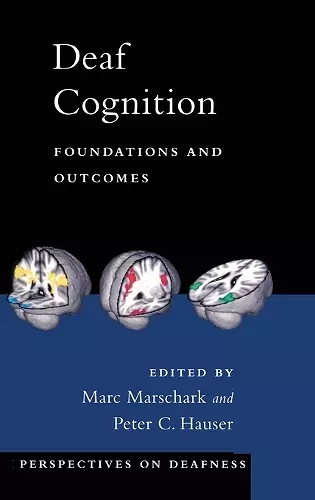Deaf Cognition
Foundations and Outcomes
Marc Marschark editor Peter C Hauser editor
Format:Hardback
Publisher:Oxford University Press Inc
Published:10th Jul '08
Currently unavailable, and unfortunately no date known when it will be back

Deaf Cognition examines the cognitive underpinnings of deaf individuals' learning. Marschark and Hauser have brought together scientists from different disciplines, which rarely interact, to share their ideas and create this book. It contributes to the science of learning by describing and testing theories that might either over or underestimate the role that audition or vision plays in learning and memory, and by shedding light on multiple pathways for learning. International experts in cognitive psychology, brain sciences, cognitive development, and deaf children offer a unique, integrative examination of cognition and learning, with discussions on their implications for deaf education. Each chapter focuses primarily on the intersection of research in cognitive psychology, developmental psychology, and deaf education. The general theme of the book is that deaf and hearing individuals differ to some extent in early experience, brain development, cognitive functioning, memory organization, and problem solving. Identifying similarities and differences among these domains provides new insights into potential methods for enhancing achievement in this traditionally under-performing population.
"This volume represents the state of the art in research that asks, 'What are the cognitive processes of individuals who learn through their eyes?' This central question advances our thinking about why deaf children have difficulties in schools, and this book presents a compendium of research approaches and results that will propel that thinking forward and begin to suggest new and better pedagogy that focuses on learning differences and not learning deficits." --Thomas E. Allen, Director, Science of Learning Center on Visual language and Visual Learning, Gallaudet University "Marschark and Hauser are leaders in the field and they have put together an exciting, superbly organized, and in-depth volume in an area that bridges major endeavors, leading to entirely new views on cognition and education and on the intertwining of research and practice. Its underlying concept of looking to the future using advancements in technology and knowledge is masterful. I consider this to be a must read for anyone looking for a comprehensive and progressive program on cognition and education for deaf, as well as hearing, children." --Ursula Bellugi, Professor and Director, Laboratory for Cognitive Neuroscience, Salk Institute for Biological Studies "Skillfully edited, this up-to-the-minute set of studies provides an essential overview of current work on the cognitive skills of deaf students. It provides a strong basis for addressing the many challenges for deaf education, based on empirical studies in cognitive psychology."--Ruth Campbell, Chair of Communication Disorder, University College London "What a remarkable and provocative book! Marschark and Hauser have included cutting-edge cognitive topics such as cochlear implants, theory of mind, numerical cognition, measures of verbal aptitude, visual attention and--one of my favorites--language comprehension. The persistent call for scientific research on the cognitive underpinnings of deaf children sounds familiar, but timely, especially if we expect our teaching and clinical techniques to be effective. You may disagree with some of the interpretations--as I did--but you cannot ignore the compelling arguments and evidence. This book is bound to influence theory, research, and practice for years to come."----Peter V. Paul, Professor of Education, Deaf Education/Deaf and Sensory Studies, College of Education and Human Ecology, Ohio State University "Upon my initial read of this work, I became fascinated by the information that the different academic contributors provide for the reader. Everything from theory of mind to mathematical reasoning to visual attention literature among the deaf is reviewed in an attempt to solidify a conceptualization of the elements that would be critical to the development of new best practices in the education of the deaf. Much of this new material is novel and offers unique contributions that could definitely strengthen the provision of services to deaf learners and help maximize their educational potential."--Kathy J. Pierce in PsycCRITIQUES "For any professional interested in deafness, development and learning, this edited volume is essential reading because it brings together the thinking around deafness and cognition which has developed since the days of a very deficient view of deafness and its impact on learning...A refreshing aspect of this volume is that it strips back the assumptions made about differences between spoken and sign language users and challenges us to think again about the language issues for all deaf learners and how they are addressed in the learning context...If you want to understand more about deafness, cognition and learning...an important and authoritative resource that you will regularly go back to."--Reviewed by Ruth Swanwick, University of Leeds, in Deafness and Education International
ISBN: 9780195368673
Dimensions: 160mm x 236mm x 28mm
Weight: 862g
496 pages